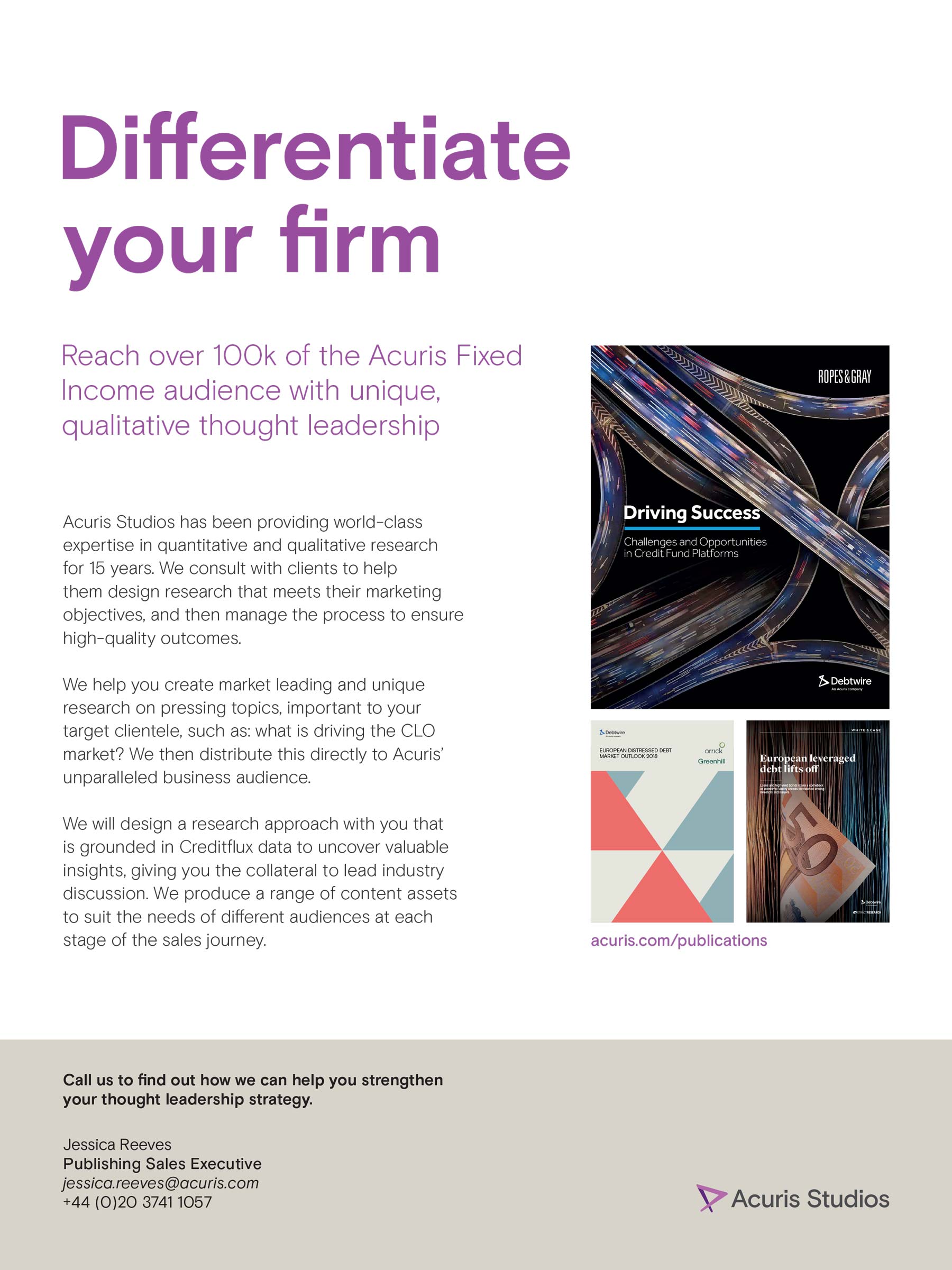

July 2021 | Issue 236
Opinion Loans
I’ve been doing ESG for 27 years; I just didn’t know it

Joe Moroney
Senior partner and co-head of global corporate credit
Apollo Global Management
Born:
New Jersey
Lives:
The Jersey Shore
Education:
Rutgers University with a BS in ceramic engineering
Fun fact:
Moroney says he might be the only person in New Jersey who doesn’t like Bruce Springsteen
Last holiday:
Miami, Florida
Favourite movie:
Anchorman, the Legend of Ron Burgundy; “because it’s got bits of real panther in it, so you know it’s good”
Bucket list:
to obtain a
single-digit golf handicap
Career:
Moroney worked at MetLife and Merrill Lynch Investment Management before joining Aladdin to build its CLO management business in 2001. He launched nine Landmark CLOs for the firm before joining Apollo in 2008 as the private equity giant expanded into credit.Apollo:
has about $461 billion of assets under management with credit accounting for $323 billion. Since launching its first CLO in 2010 the firm has emerged as the sixth-largest issuer globally with $25 billion of CLOs. In March, Apollo and insurance company Athene agreed to merge.Q.
How did you get into the CLO business?
A. In 1994, I joined MetLife as a junior trader for investment grade corporates and leveraged loans. I continued investing in loans at Merrill Lynch Asset Management where we launched Longhorn in 1999.
At Apollo, we launched ALM 2010-1 as one of the first CLOs after the financial crisis and I’d say it was scarier launching a CLO in early 2010 than in the late 1990s. There were a lot more questions about the future of the product after the financial crisis. But one of our hallmarks at Apollo is that where other investors are running away from a burning building, we’re putting on our fire suits to see what we can save. That’s demonstrated by the fact we launched our corporate credit business in late 2008, just three months removed from the Lehman Brothers’ bankruptcy.
At Apollo, we launched ALM 2010-1 as one of the first CLOs after the financial crisis and I’d say it was scarier launching a CLO in early 2010 than in the late 1990s. There were a lot more questions about the future of the product after the financial crisis. But one of our hallmarks at Apollo is that where other investors are running away from a burning building, we’re putting on our fire suits to see what we can save. That’s demonstrated by the fact we launched our corporate credit business in late 2008, just three months removed from the Lehman Brothers’ bankruptcy.
Q.
What are the best and worst investments in credit today?A.
We are leaning into private credit and like this because you can construct paper that has better downside protection than liquid markets. We have a large enough platform that we can control our destiny, rather than buying what’s available.
Given recent interest rate volatility and debates around inflation, we have been underweight long duration, fixed-rate investment grade corporates and we’re leaning towards floating rate paper.
Q.
What is the best credit trade you’ve made?
A.
Personally, it was accepting the job offer in 2008 to join Apollo. It’s hard to beat that as I’m a better investor today than back then. On the asset side, I was lucky enough to be part of a small team that bought LyondellBasell and turned it into one of the industry’s best investments of all time. We bought first lien loans at 13 cents and rode that all the way north of par. All told, that investment yielded about $10 billion in profits.Q.
And the worst?A.
We had exposure to Charming Charlie and that was not a great experience. Lesson learned: putting specialty in front of the word retailer does not make it a better investment.Q.
Where is the market heading?
A.
The momentum in the economy is good and we have a declining default rate in the short-to-medium term. Fundamentals are improving in the form of debt to ebitda, cashflows and leverage. You would expect valuations to improve alongside that, but we are already tight. There is room for spreads to tighten, but not much. Clipping coupons and getting carry-type returns could be the best we can get in the foreseeable future. Unless you’re willing to break though all-time tights, spreads will be range bound.
Over the medium-to-long term there is a likelihood spreads are going wider, and in the meantime we will experience bouts of volatility.
Leverage is a way of boosting returns, but it depends on the type of leverage. CLOs with non-recourse, non mark-to-market, long-term leverage are a flexible and effective way of obtaining leverage. Given my views on volatility, I would be extremely judicious about using total return swaps and mark-to-market facilities.
Q.
What needs to change about the way your industry does business?
A.
The one large change our industry is incorporating is ESG, the basic fundamentals of which are the basis of good investing. I have been doing ESG for 27 years; I just didn’t know it. Global credit funds & CLO's
July 2021 | Issue 236
Published in London & New York.
Copyright Creditflux. All rights reserved. Check our Privacy Policy and our Terms of Use.


















